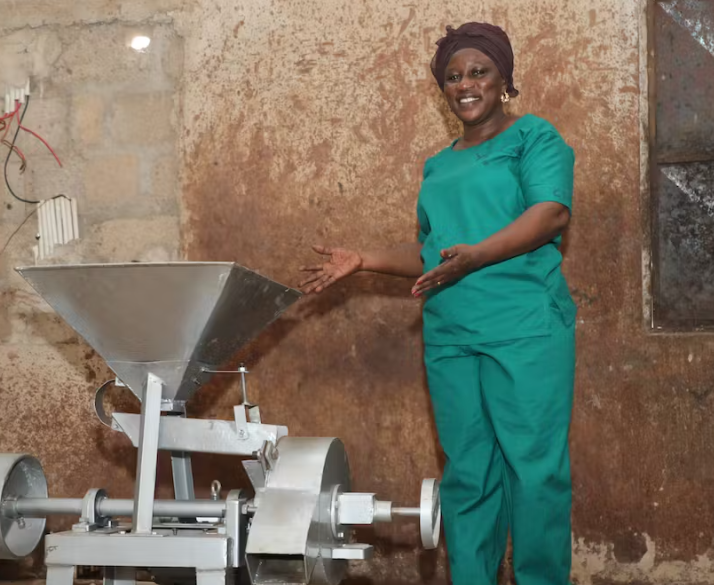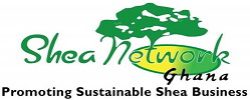When I started out, my shea butter business was small. Being informal, we were missing out on opportunities, but through perseverance and patience I am formalizing my business and plan to trade on the international market. What’s driving me is my desire to support less privileged women in my community.
My motivation to help others comes from the lack of support I experienced during my childhood.
When I was little, I lived with my auntie. She was constantly moving from place to place. I missed a lot of schooling and fell behind with my studies. At home I worked as her housekeeper and lacked basic things such as a decent shelter, clothing and most of all, parental love. I was lucky to pull through and get to where I am today.

I eventually was sent back to live with my mother and was able to complete my schooling. I decided to pursue vocational training and studied at the Institute of Fashion in Kumasi, Ghana. I then set up a small business making dresses for individual customers.
I also trained as a teacher at Tamale Training College and eventually obtained a bachelor’s degree in education from the University of Cape Coast.
It was always difficult to pay my fees and for other basic needs. My dress-making business wasn’t making enough to cover my costs. I had noticed that it was difficult to obtain soap in Tamale. This inspired me to expand my business into making soap.
I still teach today. Running a business has always been my core interest but teaching has helped me meet some of my financial needs. It’s not easy but I need to do both teaching and the business to achieve my goals.

Initially, the soap business was profitable, but the price of imported vegetable oil – the main ingredient in soap – became too expensive and I had to look for an alternative. I decided to try using locally produced shea butter and it worked!
This started my transition to shea butter production. Traditionally, it’s women who produce shea butter for household consumption, and women who pick the shea nuts on the farms. I began to mobilize the women and registered them as the Yumzaa Women’s Cooperative. This also helped maintain the quality of the shea butter.
Yumzaa employs a lot of women, and this has gone a long way in addressing unemployment in the community. Women have less access to resources and power. By undertaking this business, we seek to minimize the vulnerability of women, particularly single mothers.

When I started the shea butter production, our output was small. As demand increased, I became concerned about ownership of the land we were using, which was acquired through the traditional leader who had passed away. I also realised that clients preferred dealing with registered shea butter production companies rather than informal businesses like mine.
We lacked certification and because we were using inappropriate equipment, including household utensils, we couldn’t get our production processes certified. These challenges made me take more seriously the idea of formalizing my business.

We acquired a parcel of land through a formal land registration process. We then registered the business with the Registrar General Department of Ghana. It took us about two months to get the certificate of incorporation. We also had to register with the Food and Drugs Board. This was an expensive process as it involved travel and lots of follow up in Accra.
We also now have the Ghana National Fire Service certificate, which is very important. Registration and certification with the Ghana Standards Authority, and the Environmental Protection Agency are ongoing. I am also working to obtain organic certification.
Overcoming bureaucratic obstacles has been the most difficult part of the formalization process. At times it is hard to even understand what institutions want. I have learnt lots of negotiation and lobbying skills so I can get things done!
We need all these certifications so we can trade directly on the international market. I sleep with joy and feel successful whenever I complete another stage towards fully complying with formal requirements because I believe this will go a long way toward growing our business and improving the lives of the women and their families.

Over the past year, I’ve also got involved in a productivity improvement training programme run by the International Labour Organization (ILO). A consultant working for the ILO visited us and is providing additional business development support.
Through the ILO training, we became aware that transparency and trust issues were affecting our production. Now, after addressing these concerns, my relationship with my workers has improved. Everyone is now on board with wearing protective clothing and applying safety measures. We are witnessing more commitment and a sense of responsibility from everybody at the production facility.
The ILO has also helped provide us with two shea crushers, two kneading machines and two grinding machines. This has boosted our production from 21 to 63 tonnes of shea a month. It has also improved the quality of the shea butter we produce.
I continue to work with the ILO to improve the way I manage finance and business activities.
The ILO business training and the modern stainless steel equipment they donated to us have helped us formalize the business and will help us get additional international certifications.

Formalizing my business has taught me perseverance, patience and to pursue my heart’s desires. I would say to informal business owners that we cannot continue repeating outmoded business practices.
My big dream is to establish a shop in the European market to sell Yumzaa products. I also have another project: with my teaching skills I am working on setting up vocational training centres for students who are unable to further their education in other areas. I see it as an avenue for many underprivileged people to help them pursue their own dreams
read the original article on https://voices.ilo.org/stories/formalization-is-transforming-my-shea-butter-business
Source: voices/ilo.org
